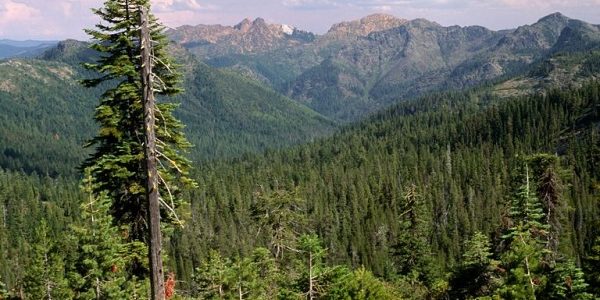Klamath-Siskiyou Region

The Klamath-Siskiyou region is unique
The Klamath – Siskiyou region has been identified as a Critical Biodiversity Area with an extraordinary concentration of endemic species. This area of southwestern Oregon and northwestern California has complex geology, topography, precipitation patterns, and fire regimes, which combine to create diverse vegetation communities and wildlife habitat. The steep climate gradients and diverse geologic parent materials support more than 1,800 vascular plant species and significant tracts of old growth forests. The region is home to at least 38 native species of amphibians and reptiles. The lifeways of Native American tribes, including the Yurok, Karuk, Hupa, and Klamath, are interwoven with these native plants and animals.
Since the early 1900s, land management emphasized fire suppression in the Klamath-Siskiyou region, as it did across the western U.S. The effect of fire exclusion in the region was a reduction in forest heterogeneity, smaller forest openings, and denser forests. Increased homogeneity and density can lead to an increase in high severity fire, which threatens to convert stands from coniferous forest to shrub or chaparral vegetation. Unfortunately, the warming climate may increase the frequency of fire and at the same time make conifer regeneration more difficult. Returning fire to the landscape with prescribed fire in the complex terrain and vegetation of the Klamath-Siskiyou region is challenging, but research suggests that using landscape features to contain prescribed fire will create burn patterns consistent with historical fires. The complex forests of the Klamath-Siskiyou region call for forest stewardship that responds to ecological variation and the high conservation value of these forests.
Resources
- Insights for resilient forest landscapes in the Rogue Basin of southwestern Oregon. Webinar, Sept. 2020.
- Restoring resilient ecosystems, communities, and economies in complex terrain. Webinar, July 2020.
- Western Klamath Restoration Partnership
- Mid Klamath Watershed Council
- Mixed‐severity fire regimes: lessons and hypotheses from the Klamath‐Siskiyou Ecoregion
- Management of mixed-severity fire regime forests in Oregon, Washington, and Northern California
Stay Informed
about our recent projects and upcoming events.
